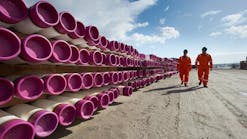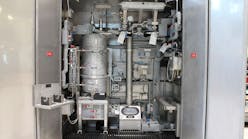GE provides refurbished turbomachinery for oil and gas facilities
As fabrication and installation costs associated with new oil and gas production and processing facilities are ramped even higher by the effects of natural occurrences such as Hurricanes Katrina and Rita, the petroleum industry is investigating the option of using refurbished equipment to replace that which was originally installed at existing offshore facilities. This is particularly true with regard to turbomachinery.
Where it makes economic sense and meets strictest safety standards, producers are choosing refurbished and rebundled equipment for certain applications; safe in the assurance that turbomachinery will continue to generate maximum output without sacrificing reliability.
One such application is being conducted at Shell UK Ltd.’s St. Fergus gas terminal on the northeast coast of Scotland, some 37 mi (about 60 km) north of Aberdeen, UK. There, GE’s Oil & Gas Group is scheduled to provide refurbished compressor modules for two gas turbines used to receive and process natural gas from more than 20 fields in the UK sector of the North Sea.
Processed throughput from the St. Fergus station meets up to 15% of the UK’s natural gas requirements. To accomplish transportation in such volumes, the two GE Frame 5/2B gas turbines at St. Fergus are being used to drive two Elliott barrel centrifugal compressors.
To reload the compressor power train, GE Oil & Gas technicians are supplying refurbished modules for the turbines’ high- and low-pressure sections. Under this GE maintenance program, gas turbines are removed and replaced in modules, substantially reducing outage durations.
In July 2005, GE’s oil and gas business signed a $400 million, 17-year contractual service agreement (CSA) covering 27 gas turbines and 47 centrifugal compressors at the liquefied natural gas (LNG) production facility in Port Fortin, Trinidad, operated by Atlantic LNG Co.
The contract includes removal of Atlantic LNG’s existing gas turbines during scheduled outages, replacing them with refurbished modules to reduce turnaround times substantially. To meet this fasttrack schedule, GE is building a dedicated, state-of-the-art service shop in Point Fortin.
Claudi Santiago, president and CEO of GE’s oil and gas business, says the patented modular replacement method is designed to increase plant availability. “Over the life of the CSA we expect this approach, coupled with the CSA structure, will add a year of production for the Atlantic LNG plant.”
In addition to the modular replacement program for the facility’s gas turbines and compressors, GE also will supply spare parts and both scheduled and unscheduled services for the duration of the CSA. These services include full technical support from GE’s Florence, Italy, headquarters through a state-of-the-art remote monitoring and diagnostics system.
Along with achieving an extra production year, GE’s contractual services team will work to enhance plant availability while ensuring the highest safety standards, says Santiago, who noted the team will apply knowledge developed through GE Oil & Gas’ extensive LNG plant experience.
Atlantic LNG is owned by Trinidad and Tobago National Gas Co., BP, British Gas, Repsol and Tractebel. Three turbo compression trains currently are in production at Port Fortin, with a fourth under construction. The plant’s total capacity places Trinidad and Tobago among the top five LNG producing regions in the world.•




